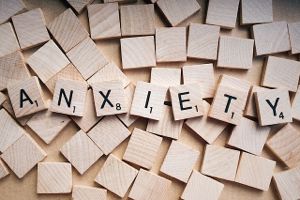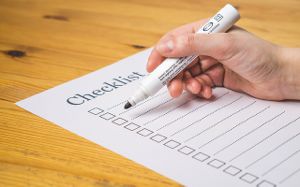Would you know if you were suffering from writer’s anxiety?
A friend of mine wasn’t getting her writing done.
It had been over a month since she’d made any progress, or even sat down to focus on the work.
It was her second novel and for a long time she was really in the zone with it, but then she found out that her first novel had won a big award.
She was thrilled, of course, and took a break from writing to get the word out, in the hopes of seeing a boost in sales. Her marketing efforts paid off, but even after the excitement died down, she still didn’t return to her work in progress.
She was basking in the success, she told me, and enjoying the positive feedback that can be so rare in a writer’s career. Yet when one month went into two and she still wasn’t writing, I began to suspect something else was going on.
I asked her about it one day, but she assured me everything was fine, and that she’d get back to it eventually. I didn’t push her until another month passed and she still hadn’t touched her manuscript. Finally it was time to jerk her out of her denial.
You see, my friend was firmly in the grips of writer’s anxiety. She just didn’t know it.
 Writers May Not Know They’re Suffering from Writer’s Anxiety
Writers May Not Know They’re Suffering from Writer’s Anxiety
Most writers have experienced anxiety at one time or another. Most of us get a bit nervous about things like doing a book signing, making a presentation at a conference, or tackling a new novel.
But anxiety can also exist without us being aware of it. It can show up in a writer’s life in a myriad of ways, sabotaging creativity and slowing progress while skating under the radar.
The victim, like my friend, remains unaware of its grip on her imagination, continuing to function fairly normally in life despite enduring these symptoms. Most have learned coping techniques that help them deal with their emotions in private, so that others remain unaware of their struggles.
The problem is that they’re not really dealing with it or lessening its effects on their bodies and minds, they’re just successfully hiding it.
Clinical herbalist M. Rylan Sían describes it well for the Ohlone Center for Herbal Medicine, stating that individuals with anxiety who continue to function in life “are often bright, successful, driven people who excel at their work and personal lives, externally,” but who suffer in silence by “decompensating” in private locations. Symptoms of their anxiety show up during these decompensating periods, and may include:
- Emotional outbursts (in private)
- Headaches, dizziness, stomach upset
- Panic attacks, hives
- Controlled substance abuse
- Rigid structuring of social and work activities
- Sleepless nights
These individuals will still meet their deadlines and make their appearances as needed, but behind the scenes they’re often fighting difficult battles against their own stress and anxiety.
Over time, the pressure of trying to appear like everything is fine when it really isn’t can build up until it causes real emotional crises, physical breakdowns, or serious health issues.
 Writers Vulnerable to Symptoms of Writer’s Anxiety
Writers Vulnerable to Symptoms of Writer’s Anxiety
If you have a panic attack before a book signing, you know that your anxiety is getting the best of you.
You can cope by taking a walk, reassuring yourself, and otherwise dealing with the issue as best you can. Typically by the time the signing is over so is your anxiety.
If you’re suffering from headaches and stomach upset and you can’t sleep and you don’t really know why, though, you can end up suffering from anxiety for a long time. That’s significantly more damaging to your emotional and physical health.
Though research has yet to prove definitively that creative folks are more prone to anxiety than those in other walks of life, there are some studies that have shown a connection. Regardless, there’s no doubt that writers often find anxiety to be their unwanted companion.
Columnist Russell Smith wrote about it in “The Globe and Mail,” describing how a Facebook post he wrote about anxiety and insomnia received responses from all kinds of prize-winning authors, including “poets and short story writers, gay and straight, commercial and underground, from coast to coast. And they all can’t sleep.”
These writers, he continued, live lives “riven by fever and fret, a life of staving off panic and the harsh voices in one’s head. Don’t believe the videos: The most famous writers in the country can’t get over their divorces and take a lot of pills.”
 7 Hidden Signs of Writer’s Anxiety
7 Hidden Signs of Writer’s Anxiety
The bottom line is that you, like my friend, may have symptoms of anxiety and not even know it. To help you become more aware of how it can sink its teeth into you, here are seven of the most common signs of anxiety in writers.
1. The Need to be Perfect
Perfectionism is a personality trait that is often connected somewhat to anxiety, as those who are perfectionists typically fear failure.
You may already know that you’re a perfectionist, but if you’ve actually finished your story or novel or blog post or new website and you’re tinkering with it ad nauseum trying to make it perfect, this is likely anxiety sabotaging your progress. Strike up your courage and take a step forward.
2. The Drive to Do, Do, Do
We’re all busy these days, but if you find that you can rarely take time for yourself to relax and have fun, you may be driven by anxiety. Low-level, chronic anxiety the likes that plagues high-functioning individuals never allows them to relax or just “let go.” They feel like they always have to be on top of things for fear something will go wrong.
You may explain it away by going on about all you have to do, what with writing and marketing and blogging and all, but it’s time to realize that the real reason may be that you’re dealing with a low current of constant fear.
3. The Presence of Chronic Ailments
Though it may be fairly easy to link insomnia with anxiety, other chronic ailments like headaches, digestive problems, joint pain, muscles aches, and back and neck pain you may blame on a stressful job or family issue.
These aches and pains, however, are often signs of anxiety. As you go through your day worried and tense, you overtax your muscles and stress your system, and your body responds the only way it knows how—with pain.
 4. The Presence of Writer’s Block
4. The Presence of Writer’s Block
No matter what you’re working on, if you’ve stopped, it may be anxiety that’s causing it. Like my friend who suddenly quit working on her novel (her fear was that it wouldn’t be as good as the award-winning previous novel), you may have a sudden fear connected to your work that blocks your progress.
Writers often blame it on something else—difficulty with plot, stressful life events, etc.—but it’s worth considering that fear may be getting in your way.
5. The Feeling of Impending Doom
Those dealing with anxiety often feel like if they let go even just a little bit, everything will come crashing in on them. So they work even harder to keep a grip on their feelings, even as they sense that eventually, they will no longer be able to keep it up.
Writers may blame their long to-do lists for this feeling, but long to-do lists don’t produce anxiety by themselves. Instead, it’s that inner turmoil and self-doubt that makes writers worry about their ability to keep it all together.
6. The Presence of a Nervous Tick
Do you have something that could be described as a nervous tick? Do you bite your nails, tap your foot, crack your knuckles, or some other similar behavior on a regular basis? These traits or ticks are usually signs of a nervous person inside.
Observe a relaxed person—he usually sits back and lets his body go loose. An anxious person is tense, and often has some movement that betrays the anxiety going on behind the outward façade of control.
 7. The Desire for ALL the Details
7. The Desire for ALL the Details
Anxious people fear trying something new or even taking a new action without first getting all the details and making sure they know exactly what to do and what’s expected of them.
If you drive the bookstore crazy with your emails full of questions about everything that might happen on signing day, including exactly where you’ll be set up, whether you’ll have a table and chair or table without a chair, whether you’ll be near the mystery or the self-help section, whether the room temperature will be at 70 or closer to 67 degrees, etc., that is likely your anxiety showing its face.
Though it’s always good to be prepared, realize when you may be overdoing it a bit and tell yourself to relax, that you can do this.
 Tips to Help You Deal with Hidden Writer’s Anxiety
Tips to Help You Deal with Hidden Writer’s Anxiety
These are only some of the ways that anxiety can show up in your creative life. There are others.
The trick to helping yourself to feel better and to freeing up your creativity is to increase your awareness. When something isn’t quite right in your writing life, consider that it could be caused by anxiety.
Once you are aware of the issue, it’s much easier to address it and to take care of yourself. The goal is not to get rid of anxiety completely, as that may not be possible, but to learn to better cope with it so that instead of just hiding it from the world, you’re actually helping yourself to feel just a little more calm every day.
To Calm Writer’s Anxiety: Meditate.
This is one of the best approaches to anxiety, and has been shown in studies to help people to calm down. Try just 10 minutes of sitting quietly and focusing on something like a favorite image, candle flame, or single sound (“om”) and allow your thoughts to come and go without reacting to them. Keep your attention on the candle flame and on your breath, in and out.
 Increase your comfort as much as you can.
Increase your comfort as much as you can.
Those who are trying to keep going while suffering from anxiety can overtax their systems by constantly trying to be like everyone else.
But meeting demands that don’t take your anxiety into account can leave you drained and uninspired when it comes time to write.
Instead, step-up your self-care by increasing your own comfort. Stress kills creativity, so limit the stressful activities you tackle each week. Don’t avoid everything that may cause you stress, but find a threshold—say, three stressful activities or social gatherings per week—and try not to go above that. That way you’ll still have your reserves intact when it’s time to write.
Make friends with your writer’s anxiety.
Trying to tell yourself you feel confident when you don’t isn’t going to help. Admit that anxiety is with you, and find ways to deal in the moment. You may be able to distract yourself with music, for instance, or by counting backwards by four from 100.
If you’re in a social situation, such as a book signing, put your focus on others and on making them feel at ease, to help get your attention off your own anxious feelings. If you’re anxious when facing the blank page, take a few deep breaths and write anyway. Keep practicing and your coping techniques will improve.
 Talk to someone.
Talk to someone.
One of the most dangerous parts of anxiety is that individuals rarely share what they are really going through. They keep their feelings bottled up inside where they will eventually cause damage.
Choose a therapist or really good friend to share your feelings with. Journaling is also a very healthy coping technique, and may even lead to new ideas you can use in your poems, stories, and novels.
Get involved in a group activity.
Anxious people often have difficulty in social situations, and some struggle even to get out of the house. Writers are often isolated by nature, which means it’s even more important to do something that counteracts all that alone time.
Your best bet is to join a group of some sort—a sports team, music group, art class, volunteer group, or other organization—so that you’re actively taking part is something that includes other people.
The fact that you’re expected to be there will help overcome your resistance, and the group’s focus on something fun or good or the community will help you relax and enjoy what you’re doing, which is a great way to help leave the anxiety behind for awhile. Most writers return to the page refreshed and feeling more confident in themselves.
 Calm Writer’s Anxiety with Herbs.
Calm Writer’s Anxiety with Herbs.
Many writers regularly make use of natural herbs that help with anxiety.
Some good options include lemon balm, kava (though it may make you sleepy), skullcap, chamomile, and l-theanine. Always check with your doctor to make sure the herbs won’t interfere with any medications you’re taking.
Allow yourself to fail.
This is perhaps the most important thing people with hidden or high-functioning anxiety can do. Send that story out there and let the rejections come in. Publish that book and allow the negative reviews.
Send your story in for a critique and let the red pen fly. Anxiety is closely related to fear, and fear for writers is usually fear of failure, fear that readers won’t like our work, or that we’ll be deemed not good enough.
Facing that fear can help you realize that failure is never as bad as you may think it will be. Of course, it’s not fun, but it’s a necessary step on the way to improving as a writer. If you are someone who is keeping a million balls up in the air, you may also need to allow yourself to fail in other areas of your life so you can make more room for your writing.
 Find Yourself by Claiming Your Writer’s Anxiety
Find Yourself by Claiming Your Writer’s Anxiety
Perhaps the most important thing is to realize that anxiety can make writing and life a bit more difficult to deal with, and to cut yourself a break.
No one else is going to understand what you go through on a daily basis as well as you do.
In the end, if you’re to continue writing the stories you want to write, it’s up to you to accept and manage your anxiety as best you can. Use whatever coping techniques work for you so you may continue to fight the good fight.
“To venture causes anxiety,” said philosopher Søren Kierkegaard, “but not to venture is to lose one’s self…And to venture in the highest is precisely to be conscious of one’s self.”
How do you manage your anxiety?
Sources
“What Are Anxiety Disorders?” American Psychiatric Association, http://www.psychiatry.org/patients-families/anxiety-disorders/what-are-anxiety-disorders.
Rylan Sían, “A Phytotherapeutic Look at High-Functioning Depression and Anxiety,” Ohlone Center for Herbal Medicine, 2016, http://www.ohlonecenter.org/phytotherapeutic-look-high-functioning-depression-anxiety/.
Russell Smith, “Russell Smith: Forging the Bond Between Creativity and Anxiety,” The Globe and Mail, November 9, 2016, http://www.theglobeandmail.com/arts/books-and-media/russell-smith-forging-the-bond-between-creativity-and-anxiety/article32768522/.


Goog morning, Colleen. My anxiety expresses itself mostly through points 6 and 7, and most of the times, it gets me without me knowing. It is a subtle feeling crawling patiently but inevitably.
I would suggest a hot bath with basil, rosemary and big salt too.
Boil one liter of water with a handful of the aforementioned herbs and a spoonful of big salt. Drain the water (now infused and with a dark yellow color) and add some cold water to bring it to a moderate temperature.
First take your average bath, then wash yourself with this other one from head to toes but not in a single take.
Empty the bucket in three or four takes.
Piece of advice: since you’ll feel sleepy afterwards, lay down for an hour or so. If sleep gets in, just let it.
That sounds super relaxing, Alessandro. Thanks for the tip!
Making friends with your anxiety is absolutely required! Because yep, it’s gonna be there. Great piece, Colleen!
Thanks, Susan! :O)